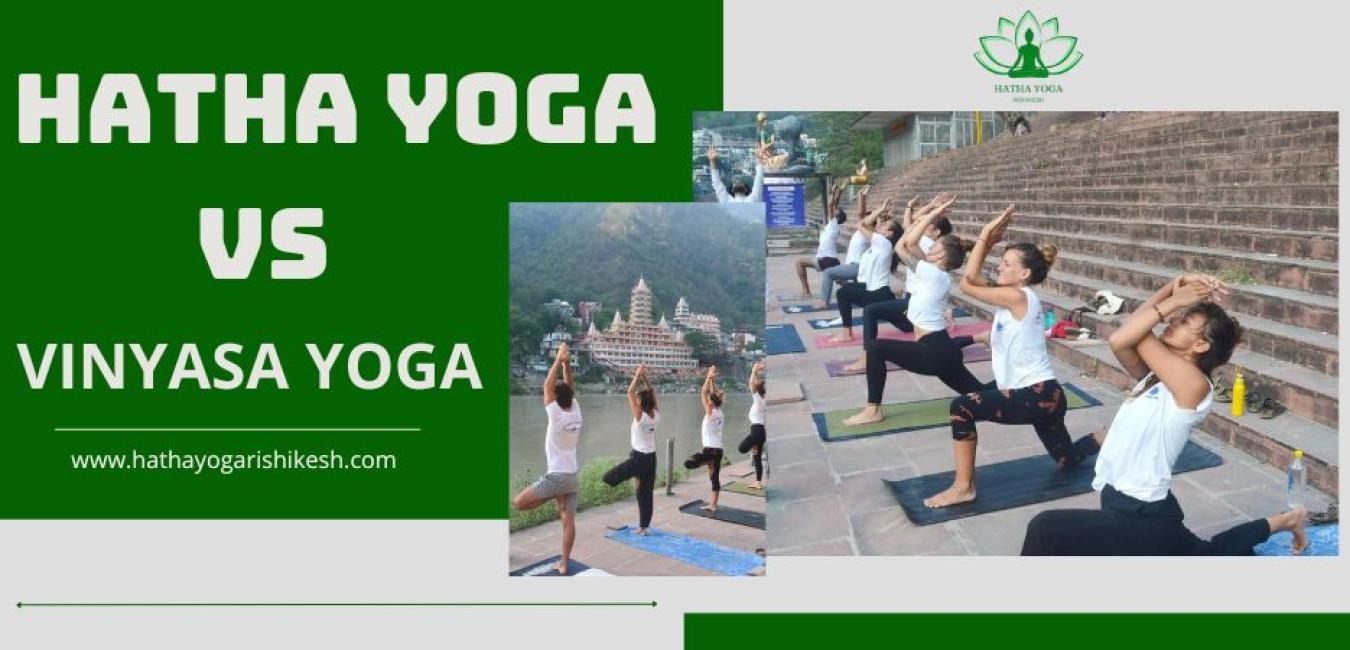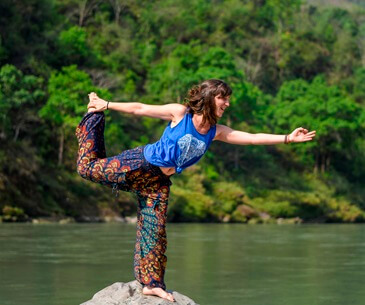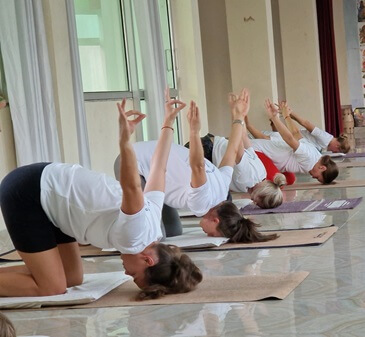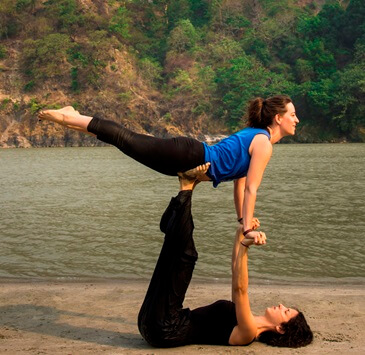
25 Mar, 2025
Yoga is a great way to improve both physical and mental health. Among the various styles of yoga, Hatha and Vinyasa yoga are two of the most well-known ones. Both pose similar poses but vary in intensity, speed, and approach overall. Knowing how they differ will enable you to select the one that suits you best.
If you are struggling to choose between Hatha yoga vs Vinyasa yoga, think about your fitness level, energy level, and what you want to achieve. Hatha yoga is a slow practice that emphasizes the holding of poses, so it's ideal for beginners and those who want to unwind.
Vinyasa yoga is active, with smooth-flowing movements that increase strength and stamina. Whether you like to improve flexibility, reduce stress, or enjoy a more intense workout, learning both styles will help you make an intelligent decision. By exploring the differences and benefits, you can make an informed decision and choose the practice that aligns best with your wellness journey.
What is Hatha Yoga?
Hatha yoga is a classical style of yoga that focuses on physical postures (asanas), regulated breathing (pranayama), and meditation. The word "Hatha" means "force" or "discipline," referring to the balance between effort and relaxation. In contrast to quick-paced styles, Hatha yoga involves holding poses for an extended period of time, enabling practitioners to go deeper into the stretch, enhance alignment, and develop mindfulness.
Benefits of Hatha Yoga
- Increases flexibility and strength – Sustaining poses for a long period stretches and lengthens muscles, enhancing flexibility. Sustaining postures also strengthens the core, arms, and legs, leading to increased stability and control of the body.
- Increases mindfulness and concentration – The slow and meditative pace of Hatha yoga enables one to concentrate on breathing control and body awareness, resulting in enhanced concentration, self-awareness, and emotional stability.
- Reduces stress and anxiety – Deep breathing exercises and meditative practices included in Hatha yoga calm the nervous system, decreasing stress hormones and inducing relaxation. This can be particularly helpful for those suffering from anxiety, insomnia, or high-stress lifestyles.
- Promotes improved posture and alignment – Regular practice of Hatha yoga enhances spinal alignment, minimizes neck and shoulder tension, and improves postural imbalance brought about by excessive sitting. Better posture not only enhances physical beauty but also protects against musculoskeletal disorders in the long run.
- Boosts general well-being – Hatha yoga enhances blood circulation, promotes digestion, and promotes relaxation, leaving one feeling better overall and with better sleep. Practice can also lead to enhanced lung function, emotional equilibrium, and increased self-awareness.
Also Read: Hatha Yoga Sequence
What is Vinyasa Yoga?
Vinyasa yoga definition is a flowing style that coordinates the breath with movement in a continuous sequence. "Vinyasa" is the name given to "to place in a special way," referring to the smooth transition between positions. It is also called "flow yoga" due to its fluid and dynamic nature. Each movement is paired with an inhale or exhale, giving a meditative and cardiovascular exercise.
Benefits of Vinyasa Yoga:
- Enhances cardiovascular health – The long and quick movements of Vinyasa yoga increase the heart rate, which increases cardiovascular strength and enhances circulation. This is an excellent choice for individuals who wish to enhance heart health and stamina.
- Develops strength and endurance – By working multiple muscle groups in quick succession, Vinyasa yoga tones the muscles, enhances stamina, and builds body strength as a whole. It is especially useful for developing lean muscle, toning the core, and muscular endurance.
- Enhances coordination and balance – Movement through various postures promotes neuromuscular coordination and better develops balance, agility, and spatial perception. This is of great benefit to athletes as well as anyone wanting to enhance the control and efficiency of the whole body.
- Boosts energy and mental focus – The dynamic movement and rhythmic breathing of Vinyasa yoga energize the body, building energy and sharpening mental clarity. It can also counteract fatigue, enhance mood, and increase focus during the day.
- Helps weight control – Because it is of high intensity, Vinyasa yoga can be a great exercise to burn calories, helping lose weight and achieve other fitness goals. Combined with a healthy diet, it can be a great assistance to keep a person leading an active and healthy life.
Difference Between Vinyasa and Hatha Yoga
Although both styles use yoga poses and breathing exercises, the primary differences include their approach and Impact.
|
Features |
Hatha Yoga |
Vinyasa Yoga |
|
Pace |
Slow and steady |
Fast and flowing |
|
Breathing |
Deep, controlled |
Synchronized with movement |
|
Intensity |
Gentle to moderate |
Moderate to high |
|
Focus |
Holding poses for longer, improving flexibility and mindfulness |
Continuous movement, building strength and stamina |
|
Best for |
Beginners, relaxation, improving posture, stress relief |
Cardio workout, endurance, strength, weight loss |
|
Experience Level |
Suitable for all levels, especially beginners |
Recommended for those with some yoga experience |
Hatha Yoga vs Vinyasa Yoga: Which One You Select?
Hatha vs Vinyasa Yoga choice is based on your individual preferences, fitness level, and health goals.
Choose Hatha Yoga If You:
- Are new to yoga and prefer a slower approach.
- Want to focus on alignment, breath control, and mindfulness.
- Seek stress relief, relaxation, and mental clarity.
- Need a low-impact exercise to improve flexibility and posture.
- Prefer a meditative experience that enhances self-awareness and emotional balance.
Choose Vinyasa Yoga If You:
- Enjoy a more dynamic and physically challenging workout.
- Want to build strength, endurance, and cardiovascular health.
- Prefer continuous movement and fluid transitions.
- Like variety in your yoga practice, as no two classes are the same.
- Seek an energetic and uplifting practice that boosts both mental and physical stamina.
Conclusion
Both Hatha and Vinyasa yoga have special benefits, and each is a perfect option for various purposes. If you like a slow and meditative practice, Hatha yoga is the most suitable option. However, if you want a flowing sequence and high-energy practice, Vinyasa yoga would be the more suitable one.
The best thing about yoga is the fact that it is so adaptable—you can try both options and discover which practice works best for your mind and body.
Regardless of which style you choose, consistency is the most important thing. Yoga practice regularly can enhance flexibility, build strength, and improve mental well-being. Yoga is a process of self-discovery—discover what works best for you, listen to your body, and adopt the practice that suits your lifestyle and intentions.


